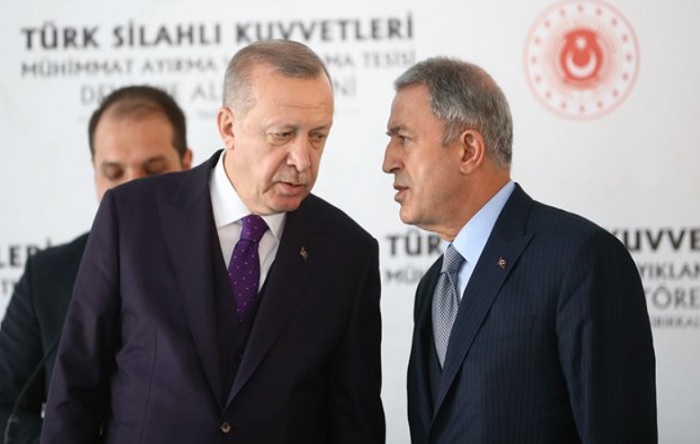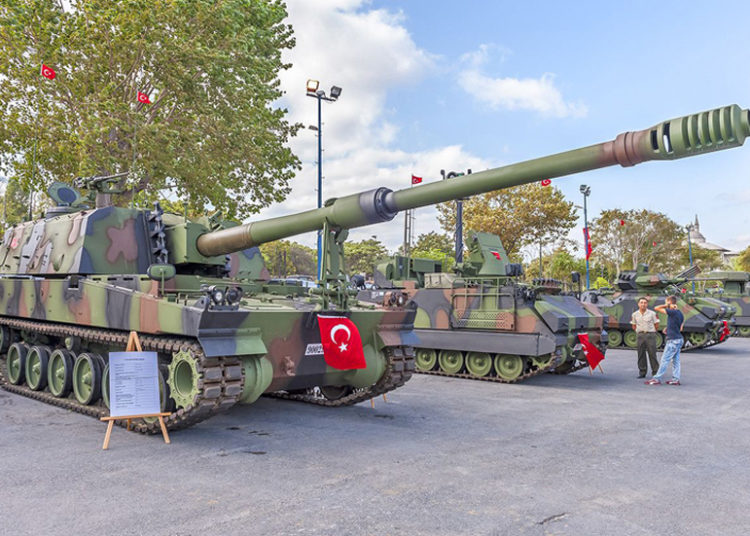Levent Kenez/Stockholm
Turkish Defense Minister Hulusi Akar stated during budget negotiations in parliament on November 22 that the engine and transmission systems for domestically produced tanks and artillery could not be supplied, criticizing foreign countries without mentioning them by name. Akar had given lawmakers literally the same excuses last year during budget hearings and promised that domestic tank production would start very soon.
Claiming that the government had made all kinds of political, military and commercial attempts to procure engines and transmission systems from abroad for the mass production of the Fırtına howitzer and the Altay tank, Akar said, “Unfortunately, this process has been adversely affected, and delays have occurred due to barriers erected by some countries.”
The Altay project is Turkey’s first main battle tank development program, which includes electronic command and control systems, a 120-millimeter gun and armor, all of which will be made by Turkish defense contractors.
Akar added that apart from efforts for procurement from abroad, work for the domestic production of engines and transmission systems is continuing.
Akar talks about the Altay project in his parliamentary speech:
Meanwhile, İsmail Demir, head of the Presidency of the Defense Industry (Savunma Sanayii Baskanligi, SSB), Turkey’s top defense procurement agency, told the state-run Anadolu news agency in September that they had integrated power systems that were imported from Korea into the tank, adding that the tests had already begun. Demir acknowledged that they were working on some disruptions that needed to be fixed but said the feedback was positive so far. According to Demir, mass production of the tank may begin in 2023.
Military experts, however have reservations about the engines and transmission systems developed by Korean companies Hyundai Doosan Infracore and S&T Dynamics. They say the Korean power system may be incompatible with the Altay tank and that the solution may take longer than expected. They also mention that even Korea prefers the German engine that was previously used in early Altay prototypes in its domestic tanks.
Akar had previously argued that the best solution for the project was to use German technology, following a meeting with German Defense Minister Annegret Kramp Karrenbauer in February 2021 in Berlin. “The Altay was developed based on a German engine. Finding an alternative engine from another country and integrating it into the tank is not a simple matter. The design of the tank needs to be changed. Therefore, the most appropriate solution would be the procurement of the German power system.” However, Akar himself clarified in November 2021 that German Rheinmetall would not take part in the project. It was no secret that there were serious delays in the project due to the German government’s undeclared arms embargo that started in reaction to Turkey’s military interventions in Syria in recent years.

Regarding the 16-year project that has turned into an enigma, Turkish President Recep Tayyip Erdoğan declined the offer of a private company that had already produced a prototype and was ready for mass production; yet he contracted another company owned by a businessman in his close circle, sparking a great deal of controversy in 2017. Erdoğan has announced several times that mass production of the Altay tank would begin shortly, pointing to various dates.
Turkey’s engine need is not only for domestic tank production. The Fırtına howitzer, which is a domestic artillery project, also needs an engine and transmission system. Since the license agreement could not be made with the Germans who had provided the systems in the past, Turkey looked for alternate suppliers. According to Minister Akar, talks with the Americans have reached the final stage. “We are making every effort. We tell them you have to give us these engines,” he told lawmakers last week.
Turkish media previously reported that Turkey had agreed on financial conditions and signed a pre-agreement with the US-based RENK America and Allison Transmission companies.
The Turkish land forces rely heavily on Fırtına artillery in cross-border operations, especially in Syria, to provide cover for its troops and suppress enemy fire. Turkey also wanted to export them to other countries but was blocked by Germany. According to Akar, six Fırtına were manufactured in Turkey in 2021. However, they were produced by using long-ago imported engines for developing prototypes.












